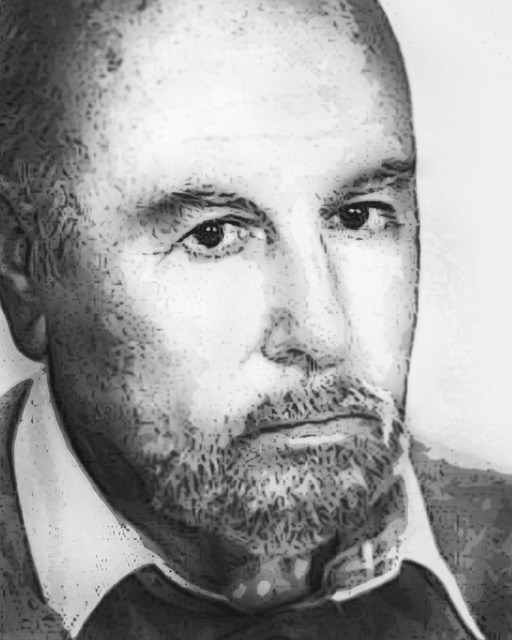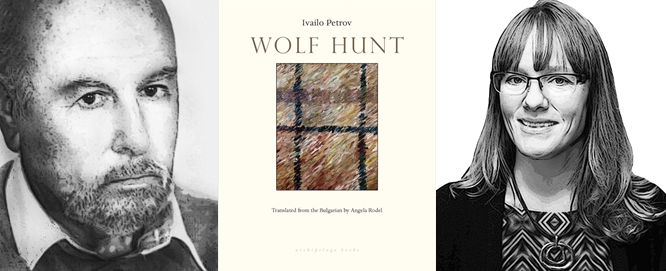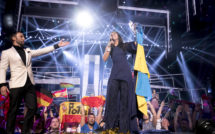

This is part of our feature on Poets and Power: Language of Resilience from Central and Eastern Europe
Translated from the Bulgarian by Angela Rodel
I’ll try to introduce to you the six hunters individually and I’ll start with him, since he was the reason they set off in that miserable weather to track wolves.
Years ago, Salty Kalcho was the syndicated watchman for the village vineyards. He wore a tan military uniform and a peaked cap minus the cockade, pulled down low over his brow year-round, he also had a cartridge pouch on a strap, white gaiters, and a rifle slung over his shoulder. He had gotten the uniform itself from the soldiers at the border post, while the gaiters with their goat-hair laces were his own domestic production. Ivan Shibilev had read somewhere – albeit with considerable delay – that the Russian defense minister after the revolution was some Trotsky or other, and thus had dubbed the uniformed watchman “Trotsky.” We were related to the Trotsky family along a couple of lines (my grandmother and his wife were the daughters of two sisters), so we did most of our farmwork together. We would hoe or reap one of their fields, then one of ours – this collective work was called medzhiya. Trotsky had about a dozen acres of land, left completely to the womenfolk, as he had a strong aversion to agricultural labor. His wife and three daughters worked the fields and also raised livestock, since the land alone could hardly keep four mouths fed. On rare occasions during hoeing or reaping time, Trotsky would come down to the field to demonstrate his speed and skill at such work. People from the nearby fields would stand up in their rows to watch him, while he, in his peaked cap and uniform jacket buttoned up to the very top, with his cartridge pouches at his waist and his rifle over his shoulder, would take up a swath as wide as half the field and start hoeing or reaping away. He would work so fast that even ten men couldn’t keep up with him, without stopping for a minute from morning until noon, then in the afternoon he would toss down his hoe or scythe and head back to the vineyard.
He had a spacious and comfortable shack there thatched with a thick layer of hay, with a fireplace and a bed, he even built a two-story veranda on the front of it. Our vineyard was right next to his, and when I’d go with my grandfather to pick cherries or grapes, I was always in awe of the watchman, perched like a vulture on the upper level of the veranda, ready to blow his whistle or shout as soon as he spotted some suspicious character pottering around the vineyard, while the veranda itself seemed to rise to the heavens. My grandfather would often stop by to shoot the breeze and then I would have the good fortune to climb up first to the lower level, then to the upper level of his veranda, which offered a bird’s-eye view of the vineyard and the two neighboring villages. Trotsky spent his best years on that veranda. In his hours on duty, he scanned the vineyard from one end to the other like a hawk, ready like Gyuro Mihaylov* to sacrifice himself for our constitutionally sanctified and inviolable property. The only ones who unlawfully encroached on our property were local kids herding flocks nearby and dogs, thus in his years-long employ as watchman, Trotsky did not chalk up a single heroic deed besides the killing of several strays.
In his hours off duty, he would sit on the lower level of the veranda, eating or dozing in the cool shade, bareheaded and in his shirtsleeves. Only here, far from prying eyes, did he remove his uniform and munitions, but as soon as the dog caught scent of a person, he would pull them back on in an instant, even if that person was one of his own daughters. Like a knight stripped of his armor, he seemed to lose his self-confidence as a formidable personality, thus he never appeared to anyone without his uniform. Beneath his shirt, unbuttoned to the waist and yellowish-green with sweat, his chicken-like chest could be seen, hairless, white and swollen like dough; his arms, naked to the elbow, were thin as sticks, and he looked somehow yellow, like a turtle without a shell or a hedgehog without quills. Trotsky didn’t go home to eat, instead his wife brought food to him at the shack every midday and evening. Once his daughters grew up a bit, the eldest took her mother’s place, and when she was married off, she was replaced by the middle girl, Radka. At that time, the local authorities started building a paved road from the neighboring village to ours. For four years, they dug stones out of the quarry, trucked them over, smashed them into gravel, and during all those years, Radka crossed those two trenches at one and the same place every day. By the time the road was finished, she’d grown up, a young woman ripe for the picking, and wouldn’t you know – one day Zhendo “the Bandit” Ivanov sent his matchmakers calling on her father at his shack. Trotsky went down to the yard and met his guests there. He heard them out, reeled off a lengthy fit of smoker’s
cough, and sent them away: “I’ve got no daughters to marry off!”
His land had been in wretched shape since time immemorial, and now he figured that if he married off Radka as well, he would find himself face-to-face with complete economic ruin.
Not only was Zhendo not fazed by Trotsky’s categorical response, he even announced that he would go himself to arrange the match. Everyone was surprised by his eagerness to have Radka as a daughter-in-law at any cost, especially since her father enjoyed a reputation as the biggest sluggard in the village, while she herself did not shine with any particular virtues. A few days later, he went to visit Trotsky at his thatched residence by night, when he had lit the fire and was sitting down to dinner.
“I’ll cut right to the chase, my friend!” Zhendo started in after they’d said their hellos and sat down face-to-face across the fire. “It might vex you to hear it, but since you’ve got a daughter, and I’ve got a son, we need to talk. You’re the seller, and I’m the buyer, as it were. That’s how it’s been since the days of yore, and that’s how it’ll be as long as there are youngsters to marry off. If it suits you, you’ll give us your daughter, if not – so be it.” As he said this, Zhendo pulled a bottle of brandy, a hunk of cheese, and a few tomatoes out of a bag and set them on the broad stump that served as a table. “Let’s drink a snort and talk man-to-man. You know very well, my friend, that I’m not here to browbeat you, but rather to hear your final word with my own two ears. Whatever you say – that’s how it’ll be.” “Well, now, I don’t rightly know what to tell you. It’s all happened so sudden-like…” Trotsky coughed, lit a cigarette from the fire, and fell silent. He was flattered and flustered by Zhendo’s opening speech; he had been expecting arrogance and reproaches but heard only goodwill and respect, so he truly did not know what to say.
“There’s no law that says you’ve got to give your final word right this minute. Tomorrow’s another day. Don’t you go thinking that if they came asking for my son that I’d tell ’em yes or no right off the bat. I’d think it over, I’d do my reckoning. To be frank, my friend, I could choose me another daughter-in-law. Why the hell not? I’m not feebleminded or poor as a church mouse, now am I?” Zhendo went on, lifting the bottle a third time. “But Koycho has taken a shine to Radka, he won’t hear of any other girl, and that’s that. Well, I could make him change his tune right quick if I put my mind to it, but he’s my only son, now, so I says to myself – why take the wind out of his sails? And besides, Radka’s a hardworking girl, haven’t I seen her out slogging in the fields since she was a kid? But I know what’s eating at you, friend. You’re saying to yourself: Well now, if I give her away, who’ll be left to work at my place? That’s how it is, raising a daughter is like watering your neighbor’s garden. But there’s a cure for that ill, too. We’ll be in-laws, friend, we’ll look after each other. Till now you’ve done medzhiya with other folks, from now on you’ll do it with us. One day our field, the next day yours, like we’re working common land.”
Trotsky was staring into the fire, smoking one cigarette after another and listening carefully. Once Zhendo promised to help him with the fieldwork, which meant that in the future he could continue lounging on his veranda, he himself reached for the bottle, took a swig, and passed it to his guest.
“Well, lemme drink to your health as well! I got nothing against your offer, but it’s just that we ain’t ready yet, Zhendo. We ain’t ready. If this business is gonna happen, it’ll happen next year at the earliest. You can’t send a girl off empty-handed.”
“Are you hinting at a dowry? Forget all that hogwash, for the love of Pete! What, you think I came here to ask for your daughter because of some dowry, mate? If I can’t dress my daughter-in-law, then my name’s not Zhendo! When it comes to the kids, I’m no tightwad and I’m not greedy after land. Fifteen acres, a house, livestock, I won’t take ’em with me to the grave. It’ll all be left to them, let them make dowries to their heart’s content, let them live their lives.”
Trotsky was touched by his future in-law’s generosity and most of all by his frankness. He had been isolated from people throughout his adult years, he hadn’t come into conflict with anyone, so to him everyone was honest and good. Now he had to raise his final objection as well, but purely out of courtesy at this point, as had been the custom since time immemorial in such situations.
“All that’s well and good, Zhendo, but you know… Radka’s still a bit too young. She ain’t even turned eighteen yet.”
“Too young, my eye!” Zhendo cried. “Didn’t our mothers get married at that age? You know what they say: Stick a woman in a kerosene tin and if her head pops out, that means she’s ready for you-know-what. She’s like a rubber band.”
Trotsky could think of no objection to this worldly truism and smirked in affirmation. Only one formality remained – when to hold the wedding.
“On Saint Dimitar’s Day,” Zhendo said. “If you leave it any longer, you get into the Advent fast, so then we’ve got to wait all the way to the new year. Since we’ve started this thing, let’s finish it, and not drag it out like entrails at slaughtering time.”
And so it was. The local folks were rather shocked by the harmony between the in-laws, since they’d gotten used to noisy prenuptial haggling, but what shocked them most was that they had rejected the depraved aristocratic tradition of using their children’s marriage to gain some advantage for themselves. I was back to the village for a few days, so I was at the wedding too. On Sunday morning, Saint Dimitar’s Day itself, the bagpipe squealed at Trotsky’s place and the neighborhood youngsters started up a round dance in the yard. In Radka’s dingy, stuffy room, her girlfriends were dressing her in her wedding clothes, slathering her with various ointments, and singing songs. Ivan Shibilev also showed up to announce that the groom would soon arrive to take the bride to the church. In one hand he was carrying three honey cakes with sprigs of boxwood stuck into them, while in the other hand he was clutching an enormous rooster by the feet. Around the rooster’s neck hung an embroidered bag filled with grain and dried fruit. The rooster symbolized the groom’s menacing masculinity, and the full bag – the future couple’s prosperity. Ivan Shibilev was the “hostage” from the young man’s side. If the latter rejected the bride, the hostage would have to remain in the girl’s home as a slave to make up for the groom’s perfidy. In actuality, the hostage played the role of master of ceremonies at the wedding, directing what should be done when. When the bride was finally dressed, he sent word for the groom to come. At the same time, a messenger came running from Zhendo’s place and whispered in his ear that there was no one to officiate at the wedding. By tradition, the godfather Stoyan Kralev was supposed to arrange for a priest, but Stoyan Kralev was a staunch communist and had refused to enter into any dealings with men of the cloth. So Zhendo had taken this task upon himself and the previous evening had gone to remind the priest about the wedding. Father Encho had said he knew well enough how to do his job, but now Zhendo had found him lying as stiff as a board. At first Zhendo thought the old man had overdone it with brandy the night before, so he snapped at him from the doorway: “Come on now, Father, the whole wedding is waiting on you, and you’re still in bed!”
“I’m lying here, my son, I’m lying here and I can’t move an inch. I threw out my back and it’s like I’ve been split in two with an axe.”
“You mean you can’t get up at all?”
“Not at all! I can’t move anything but my eyes and my hands. I can’t even heed nature’s call, if you pardon my saying so, my dear wife has to help me wee in a bedpan like a little child.”
Goddamn Buffalo (our folks hadn’t shied from giving the priest a nickname too), who knows what’s gotten into him to pull a stunt like this on me now, Zhendo thought, and his temper flared again: “I don’t care if you’re dead as a doornail, you’ve got to get to that church. Otherwise you’ll spoil this wedding of mine, and who’s going to foot the bill? Since you can’t move, we’ll carry you over there. You’ll sing a few words and that’s that.”
“The Lord is watching from above, my child! It hurts even to breathe, getting up is out of the question – but you go to Vladimirovo and get Father Tanas to perform the wedding. Today we’d agreed that I’d go to their village fair, but you tell him I’m sick, so he has to come stand in for me.”
Zhendo leapt into the cart he’d prepared for the bride and whipped his horses all the way to Vladimirovo, making it there in only fifteen minutes. The village was having a fair, so it took him another fifteen minutes to find the priest’s house, and when he found it, they told him that the priest had gone to the neighboring village for a funeral and would be back late in the afternoon. Zhendo was at his wits’ end. He decided to go to that village and grab the priest right out of the graveyard, but when he stopped to think that they were waiting for him back at the wedding not knowing what had happened, he cracked his whip again and headed back toward home. The godparents, Stoyan Kralev and his wife, were waiting in front of his house.
“Well now, my kinsman, you’ve been gone a long time, what’s happening with the priest?”
“May God strike him dead!” Zhendo spit as he jumped out of the cart. “Last night his back started hurting something fierce, now he can’t budge from his bed. I went to Vladimirovo to get Father Tanas, but he was gone to a funeral, they may as well bury him, too, for all I care! This place is crawling with priests when you don’t need ’em, but now there’s not a single cassock to be seen.”
Stoyan Kralev tactlessly laughed out loud. “Well, then, we’ll hold the wedding Soviet-style.”
“What do you mean, ‘Soviet-style’?”
“Well, just like that, without a priest. In Soviet Russia, they have civil weddings without a priest.”
“You communists may get married without a priest, but we can’t!” Zhendo snapped at him, but then realized he was talking to his godfather, so he gave a sour smile. “Go ahead and joke around, Godfather, you haven’t got a care in the world while my ass is on the line here.”
“Since there’s no priest, we’ll have to put off the wedding!”
“Out of the question! They’ll elope if they have to, but I’m not going to wait till the new year, I’m not gonna shell out for this twice.”
Zhendo led the horses into the shed, and Stoyan Kralev started pacing around the yard. He saw weddings – and all folk traditions – as bourgeois prejudice and thus did not feel an ounce of sympathy for Zhendo. He had wanted to refuse the role of godfather as well, but his wife would have none of it. She kicked up a fuss to the rafters and declared that she would sooner serve as godmother without him than become the laughingstock of the village. Their family had been godparents to Zhendo’s family since time immemorial – that made them practically related and to dishonor those ties would be tantamount to a blood feud. After long squabbles, Stoyan Kralev agreed to act as godfather, but on the condition that he would not enter the church, so as not to compromise his ideals. He would feign a sudden attack of kidney stones and only in the evening would he reappear at the wedding as custom required. His wife would have to ask her brother to stand in for him at the church, but as she didn’t dare warn him about her husband’s impending kidney stones, she was on tenterhooks the whole time to make sure her brother didn’t slip away to the fair in Vladimirovo or wander off somewhere. When they found out there was no priest, they both breathed a sigh of relief that they could finally go back home. But then Stoyan Kralev turned around abruptly and called to Zhendo: “Kinsman, c’mere for a second! Something just popped into my head.”
Zhendo left the horses and went over to him.
“I can see, kinsman, that you’ve got your heart set on this wedding, so I’m wondering whether Ivan Shibilev couldn’t do the job in place of the priest?”
“Godfather!” Zhendo cried, his face blazing. “Forgive me for saying so, but now you’re downright mocking me! Fine, I can take a joke as well as the next person, but I would never have expected you to go this far.”
Stoyan Kralev threw a friendly arm around his shoulder and whispered: “I’m dead serious, kinsman. Don’t get angry, but listen carefully to what I’m saying. Why do they call Ivan Shibilev “the Painkiller”? Because he’s got all sorts of tricks up his sleeve. On top of everything, he’s a cantor, the priest’s right-hand man, he knows that church stuff better than the priest himself. He’ll pull on his stole, sing a few words, and that’ll be that. You went to get the priest from Vladimirovo but couldn’t find him, so after that you went to Mogilarovo and found the one there. It’s three villages away, the folks here haven’t so much as caught sight of his beard, let alone heard his voice. Plus, there’s nobody here in the village today, they’re all at the fair. There’ll be all of a dozen people in the church at most, and even if more do show up, they’ll be nothing but a bunch of blue-hairs.”
Zhendo could see that his godfather was looking at the humorous side of things, because he was a communist and didn’t respect the old-fashioned rituals. His tongue was itching to tell him that communists were good-for-nothing idlers as he had told him many times before, but right now he was in a tight spot, so he patiently heard out his advice to the end. And while he was hearing him out, it occurred to him that Ivan Shibilev, as sly and shrewd as he was, really could make short work of the wedding in place of the priest.
Ivailo Petrov (1923-2005) was one of Bulgaria’s most important writers. The recipient of multiple awards for his contributions to Bulgarian literature and culture, a national literary prize was recently established in his honor.
Angela Rodel is a literary translator. In 1996 she was awarded a Fulbright Fellowship to study Bulgarian at Sofia University. She returned to Bulgaria on a Fulbright-Hays Fellowship in 2004 and now lives in Sofia. In 2010, she received a translation grant from the American PEN for Holy Light, a collection of stories by Georgi Tenev.
This excerpt from Wolf Hunt is published by permission of Archipelago Books. Translation copyright © 2017 Angela Rodel.
Photo: Ivailo Petrov, Private
Photo: Angela Rodel, Private
Published on March 1, 2017.




